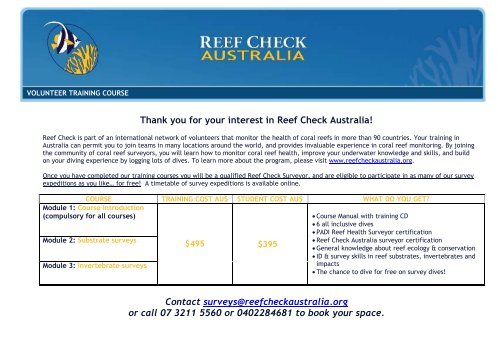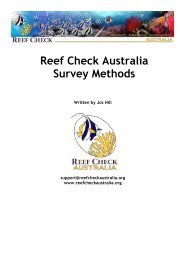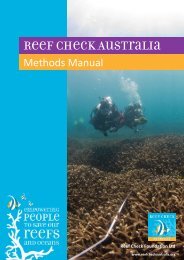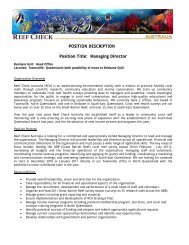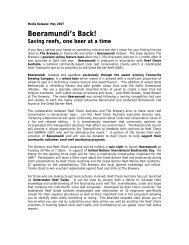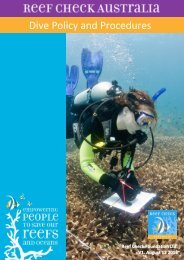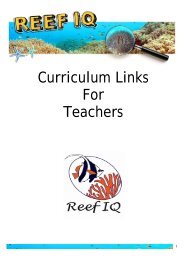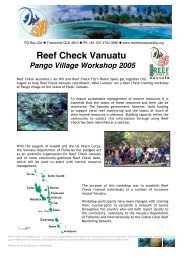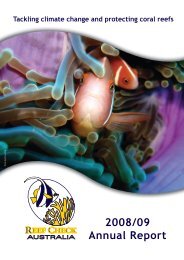Reef Check Australia Training Course Outline Module 1
Reef Check Australia Training Course Outline Module 1
Reef Check Australia Training Course Outline Module 1
You also want an ePaper? Increase the reach of your titles
YUMPU automatically turns print PDFs into web optimized ePapers that Google loves.
VOLUNTEER TRAINING COURSEThank you for your interest in <strong>Reef</strong> <strong>Check</strong> <strong>Australia</strong>!<strong>Reef</strong> <strong>Check</strong> is part of an international network of volunteers that monitor the health of coral reefs in more than 90 countries. Your training in<strong>Australia</strong> can permit you to join teams in many locations around the world, and provides invaluable experience in coral reef monitoring. By joiningthe community of coral reef surveyors, you will learn how to monitor coral reef health, improve your underwater knowledge and skills, and buildon your diving experience by logging lots of dives. To learn more about the program, please visit www.reefcheckaustralia.org.Once you have completed our training courses you will be a qualified <strong>Reef</strong> <strong>Check</strong> Surveyor, and are eligible to participate in as many of our surveyexpeditions as you like… for free! A timetable of survey expeditions is available online.COURSE TRAINING COST AU$ STUDENT COST AU$ WHAT DO YOU GET?<strong>Module</strong> 1: <strong>Course</strong> Introduction(compulsory for all courses)<strong>Module</strong> 2: Substrate surveys<strong>Module</strong> 3: Invertebrate surveys$495$395 <strong>Course</strong> Manual with training CD 6 all inclusive dives PADI <strong>Reef</strong> Health Surveyor certification <strong>Reef</strong> <strong>Check</strong> <strong>Australia</strong> surveyor certification General knowledge about reef ecology & conservation ID & survey skills in reef substrates, invertebrates andimpacts The chance to dive for free on survey dives!Contact surveys@reefcheckaustralia.orgor call 07 3211 5560 or 0402284681 to book your space.
VOLUNTEER TRAINING COURSE<strong>Course</strong> prerequisites:25 logged dives (2 logged dives in the past 6 months)Minimum PADI Advanced Diver certification or equivalentSurvey Prerequisites: 30 logged dives (2 logged dives in the past 6 months)PADI Rescue Diver qualification or equivalentOccupational dive medical (AS2299) less than one year oldEvidence of current gear servicing (for regulator with alternate air source and BCD)<strong>Course</strong> participants must provide:<strong>Course</strong> fee (Fee includes: all training sessions, dives with tanks & weights, lunch on the boat)Own dive gear to include a dive computer, dive knife, snorkel, safety sausage and whistleCopy of Diver Certification (Minimum Advanced Diver or equivalent to participate in training, minimum Rescue or equivalent forparticipation in <strong>Reef</strong> <strong>Check</strong> surveys)Access to a computer to do pre-course study on MS PowerPointSigned PADI medical statement and liability release
VOLUNTEER TRAINING COURSEPayment and contact information:‣ Please see our website www.reefcheckaustralia.org for more information on our projects.‣ A non-refundable $100 deposit is required to secure your space and receive a course manual. Full fees are required 2 weeksprior to your course start date. Please note that fees are only refundable up to 2 weeks prior to the course except forextenuating circumstances. Non-refundable fees are transferable to another course.‣ Please contact us before you make a deposit or payment‣ We are located at Level 2, 183 North Quay (Primary Industries Building), Brisbane QLD 4000
VOLUNTEER TRAINING COURSEDay 1Day 2Intensive <strong>Reef</strong> <strong>Check</strong> <strong>Australia</strong> <strong>Course</strong> Timetable<strong>Module</strong> 1-3: Introduction, Substrate and Invertebrates & ImpactsMorningBuoyancy and Methods Practice,Substrate Practice(2 dives)AfternoonIntroduction, Survey Protocol ReviewSubstrate TheorySubstrate in water Test(1 dive)Day 3 Inverts & Impacts Theory Substrate & Invertebrate Theory TestDay 4Invertebrate & Impacts PracticeInverts & Impacts in-water test(2 dives)Survey practice(1 dive)‣ Please note to participate in our Survey Program you will need 30+ logged dives. As required by Queensland WorkplaceHealth & Safety, survey divers need a current occupational dive medical (AS2299) less than one year old and evidence ofcurrent gear servicing (for Regulator with alternate air source and BCD with low pressure inflator mechanism). RCA alsorecommends current First Aid, CPR and Oxygen Provider certifications.To ensure these courses are available to as wide an audience as possible, our courses are sponsored and supported by local businesses anduniversities and also heavily subsidised by the <strong>Australia</strong>n Government. <strong>Training</strong> courses are valued at $1495 per person.
VOLUNTEER TRAINING COURSE<strong>Reef</strong> <strong>Check</strong> <strong>Australia</strong> <strong>Training</strong> <strong>Course</strong> <strong>Outline</strong><strong>Module</strong> 1: IntroductionLOCATIONAt home<strong>Training</strong>centre<strong>Reef</strong><strong>Training</strong>centreDESCRIPTIONFamiliarisation with the course content and knowledge reviewParticipants are required to read the course manual and go through the PowerPoint training presentations provided and to familiarise themselves withthis material. The purpose of the contact time with trainers is to go over the material and ensure it is understood – not to introduce this material forthe first time. Knowledge reviews should be (mostly) completed by the time we meet at Splash Watersports for training.Introduction to <strong>Reef</strong> <strong>Check</strong>, <strong>Reef</strong> <strong>Check</strong> Methods overview, data entry and interpretation overviewParticipants learn about the importance of coral communities, basic reef ecology, our need to understand how reefs change with time and potentialthreats to their health from a global and <strong>Australia</strong>n perspective; the background on <strong>Reef</strong> <strong>Check</strong> and its importance in community monitoringworldwide; the structure and objectives of <strong>Reef</strong> <strong>Check</strong> <strong>Australia</strong>; the various team tasks and responsibilities; and finally the survey methods to includethe point intercept substrate method, belt transect invertebrate and impact method.Buoyancy and methods practiceParticipants are introduced to the importance of good buoyancy when working on coral reefs; participants perform a number of tasks to practice anddemonstrate their buoyancy skills; finally participants practice the survey techniques.Data entry, reporting and mappingParticipants are introduced to the <strong>Reef</strong> <strong>Check</strong> <strong>Australia</strong> data sheets and review data entry and interpretation responsibilities of the Team Scientist and<strong>Reef</strong> <strong>Check</strong> volunteers. Participants are also shown site maps, what to include and how to use them. The trainer will also review questions regardingthe knowledge reviews.
VOLUNTEER TRAINING COURSE<strong>Reef</strong> <strong>Check</strong> <strong>Australia</strong> <strong>Training</strong> <strong>Course</strong> <strong>Outline</strong><strong>Module</strong>s 2 & 3: Substrate, and Invertebrates & impacts<strong>Training</strong>centreSubstrate Identification training part 1Participants review the <strong>Reef</strong> <strong>Check</strong> <strong>Australia</strong> substrate survey categories and codes and the importance of the information acquired by using thesecategories; photographic examples additional to those contained in the PowerPoint presentation are used to illustrate the classification of hard andsoft corals and algae.<strong>Training</strong>centreSubstrate identification training part 2Participants are shown photographic examples additional to those contained in the PowerPoint presentation for the remaining substrate categories.The substrate survey method is reviewed.<strong>Reef</strong> Substrate identification training: practical part 1Participants review the dive planning and safety procedures for <strong>Reef</strong> <strong>Check</strong> <strong>Australia</strong> prior to commencing their first dive. Participants follow thetrainer who points out various substrates and the categories to which they belong.<strong>Reef</strong> Substrate identification training: practical part 2Dive 1: Participants are required to identify into identify the appropriate category for various substrate types. On completion of this dive the answersare given. Dive 2: participants return to review the correct identifications and check those they got wrong on the first dive. Trainer also points outRCA inverts if and when they are seen.<strong>Training</strong>centre<strong>Reef</strong>Substrate identification test – photoParticipants are tested on their substrate identifications from photographs. Participants must score 80+% on this test.Substrate identification test – field.Dive 1: Participants must identify 50 substrates that are pointed out to them by the trainer. The answers are reviewed in the surface interval. Thepass-mark is 95%. Trainer will also review questions regarding the knowledge reviews.
VOLUNTEER TRAINING COURSE<strong>Reef</strong> <strong>Check</strong> <strong>Australia</strong> <strong>Training</strong> <strong>Course</strong> <strong>Outline</strong><strong>Module</strong>s 2 & 3: Substrate, and Invertebrates & impacts (continued)<strong>Training</strong>centreInvertebrate and impact trainingParticipants review the <strong>Reef</strong> <strong>Check</strong> <strong>Australia</strong> invert survey categories and the importance of the information acquired from this survey; photographicexamples additional to those contained in the PowerPoint presentation are used to illustrate the classification of key invertebrates and coral impacts.Participants also learn how to use the RCA underwater cameras for survey purposes.<strong>Training</strong>centre<strong>Reef</strong><strong>Reef</strong>Invertebrate and impact test – photoParticipants are tested on their invert and coral reef impact identifications from photographs. Participants must score 80+% on this test.Invertebrate identification practical & survey protocol practiceDive 1: Participants follow the trainer who points out various invertebrates and the categories to which they belong. Dive 2: participants do 2 x 20 minvertebrate transects in buddy pairs. The results are reviewed following the dive as well as a discussion on site selection.Invertebrate identification testDive 1: Participants must identify 20 invertebrates or impacts that are pointed out to them by the trainer. The answers are reviewed in the surfaceinterval. The pass-mark is 95%.


